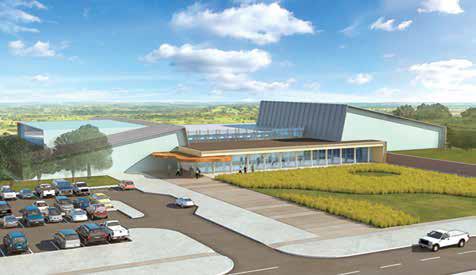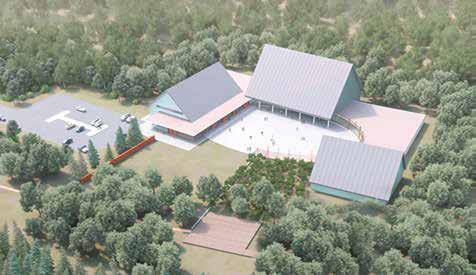Indigenous Knowledge in Canada’s Nuclear Waste Management Organization
Case Study prepared by Nivethini Jekku Einkaran, Carleton University
Keywords: Nuclear Waste Management, Indigenous Knowledge, Communities, Policies, Engagement
LESSONS LEARNED
The Nuclear Waste Management Organization (NWMO) is responsible for the safe management and disposal of nuclear waste in Canada. The organization has taken up an inclusive, open and transparent participatory approach including interested communities and Indigenous Peoples, prioritizing safety and security of the people and environment in the process. The organization has incorporated a two-eyed approach in bridging the gap between Traditional and Western Sciences to value both equally. The NWMO is working on shared ethics identifying similarities and differences by acknowledging, recognizing, respecting, honoring and supporting Indigenous Knowledge, belief systems, culture, tradition, values, customs, stewardship, language of the Indigenous peoples. The organization is conducting workshops between technical staff and Indigenous peoples to help both understand/educate about each other. As a result of the constant engagement with Indigenous peoples, NWMO has formulated policies to govern the usage of Indigenous Knowledge / Traditional Ecological Knowledge in the nuclear waste management process. “The development of this policy has benefited from advice from the NWMO Council of Elders and Youth, and through our relationships with Aboriginal organizations at the national, provincial, and regional levels” (Aboriginal Policy, 2009). Continuous revisitation of these policies, concerns and issues is helping in progress of engaging communities. NWMO has planned for a Deep Geological Repository as Canada’s approach to nuclear waste management after consultation with experts and communities.
(Note: The words ‘Aboriginal’, ‘Indigenous’ are used interchangeably in order to maintain the terms used in the references)
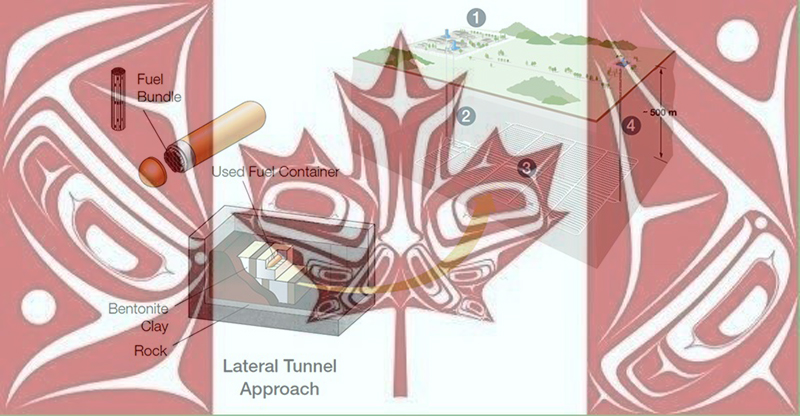
PRESENTATION
Preliminary research on the involvement of Indigenous communities in the decision-making process in managing nuclear waste in Canada was presented on November 21, 2019 in class. Major focus was given to the policies adopted by Nuclear Waste Management Organization i engaging Indigenous peoples in the process to safely store, manage and discard nuclear waste.
DESCRIPTION
The Nuclear Waste Management Organization (NWMO) is a non-profit organization established in 2002 under the Nuclear Fuel Waste Act (NFWA) by Canada’s nuclear electricity producers, Ontario Power Generation (OPG), New Brunswick Power Corporation and Hydro-Quebec (HQ) along with Atomic Energy of Canada Limited (AECL). The organization “is responsible for designing and implementing Canada’s plan for the safe, long-term management of used nuclear fuel” (NWMO, n.d.). The organization regards safety of the people and environment as the top priority in the process of used nuclear fuel management. They are guided by six values: Safety, Integrity, Excellence, Engagement, Accountability, Transparency (NWMO Mandate, n.d.). The government of Canada approved Adaptive Phased Management (APM) suggested by NWMO as Canada’s approach for long-term management of nuclear waste which is both a technical method and a management system. NWMO launched a nine-step process in 2010 and is currently in the site selection process.
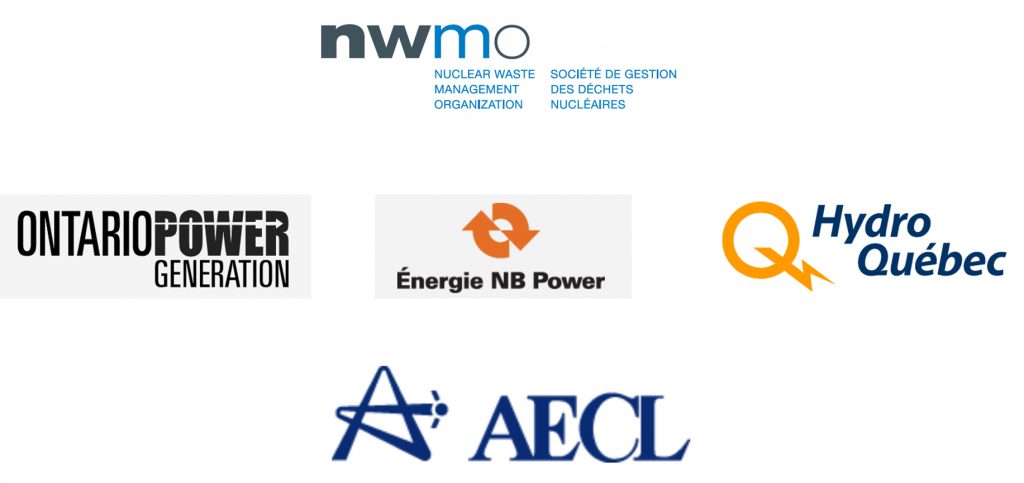
NWMO has been working closely with experts and the public, including First Nations, Métis and Inuit peoples since its establishment. “The NWMO is obliged under the NFWA to consult with Canadians and Aboriginal peoples throughout the implementation of Adaptive Phased Management (APM).” (NWMO, n.d.).
POLICIES
Aboriginal Policy, 2009: This was the first policy adopted by the NWMO with respect to engagement with Indigenous Peoples and it focused on recognizing and respecting Aboriginal Peoples beliefs on environmental stewardship; acknowledging their unique status, rights and treaties; recognizing their unresolved land claims; building relationships on a foundation of respect for their language, cultural protocols, customs, political, social, economic and political institutions; pursuing agreements for the mutual benefit of all.
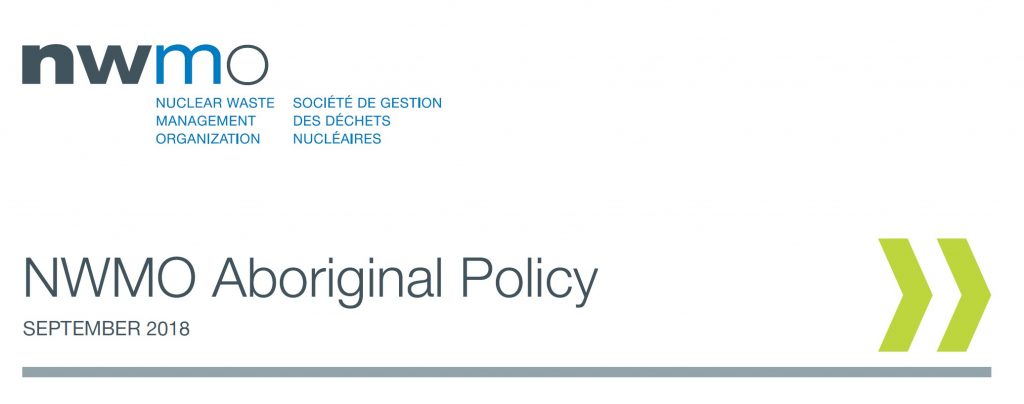
Indigenous Knowledge Policy, 2016: This policy deals with the use of Indigenous Knowledge in the NWMO’s process for the development of a Deep Geological Repository. It commits that Indigenous Knowledge will inform decisions in the planning process by looking to share their Knowledge to the extent they wish while protecting Indigenous Intellectual property; recognizing the collection, documentation and managing of Indigenous Knowledge is carried out with the interest of Indigenous communities; entering into MOUs or agreements for the protection of Indigenous Knowledge, supporting Indigenous engagement; supporting the development of community steering committees by Indigenous peoples to oversee the work; continuing to seek high-level policy advice from the Council of Elders and Youth and Indigenous governments.
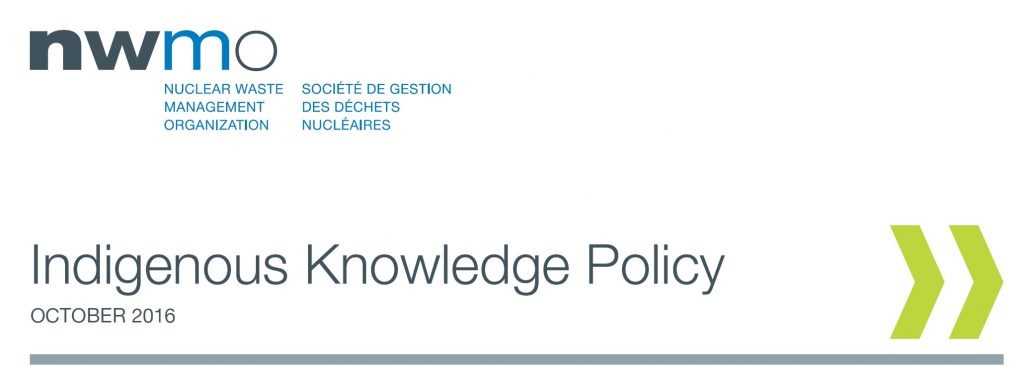
Reconciliation Statement, 2018: NWMO released a Reconciliation Statement as a contribution to their reconciliation strategy upon the good track of maintaining Indigenous relations since its establishment as stated by Bob Watts, Vice-President of Indigenous Relations. It read
“In the context of reconciliation, the Nuclear Waste Management Organization (NWMO) recognizes historical wrongs in Canada’s past and the need to create a better future by addressing the challenges of today. The NWMO Council of Elders and Youth speaks of this journey as a new era for humanity – a time of reconciliation with First Nation, Métis and Inuit peoples. The NWMO is committed to contribute to reconciliation in all its work by co-creating a shared future built on rights, equity and well-being. In addition, the NWMO will establish a Reconciliation Policy with an implementation strategy that will be measured annually and publicly reported to contribute to the Truth and Reconciliation Commission’s calls to action.”
Reconciliation Statement, 2018

Reconciliation Policy, 2019: With respect to the Reconciliation Statement and Truth and Reconciliation Commission’s Call to Action, the NWMO Reconciliation Policy was adopted in 2019. It built on the Aboriginal Policy and has now replaced it. The Reconciliation Policy focuses on committing to meaningful engagement and consultation, building respectful relationships, seeking the free, prior, and informed consent of impacted Indigenous Peoples; providing impacted First Nation and Métis people with equitable access to jobs, business opportunities, training and education in NWMO’s work; committing to provide education for management and staff on the history of Indigenous Peoples; working with impacted communities to implement the mandate and informing the site selection process with best available knowledge and ethics; working with Crown; committing to respecting and following local First Nation and Métis protocols related to burial sites found on work sites; develop an annual reconciliation plan; communicating clearly with new employees on the commitment to engagement with Indigenous peoples.
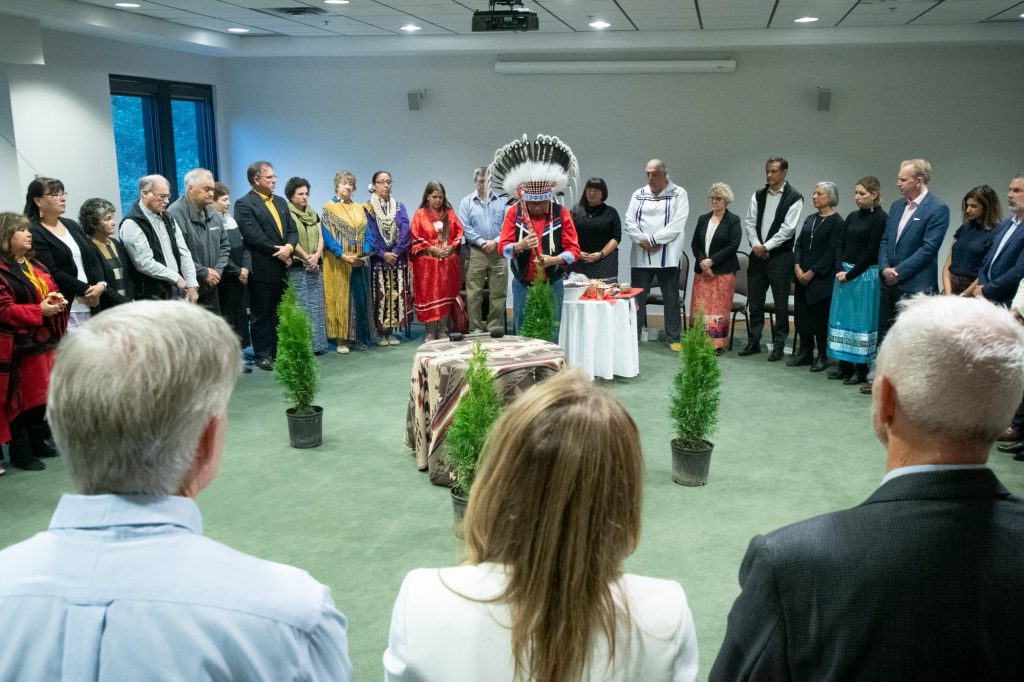
TIMELINE
- Thousands of years ago – Indigenous Peoples started settling in Canada
- 1763 – Royal Proclamation
- 1871 to 1921 – Numbered treaties or Post-Confederation treaties, a series of eleven treaties were signed between First Nations and the reigning monarch
- 50 years ago – Canada started generating power from nuclear energy
- 1982 – Constitution Act – Section Thirty-five provides constitutional protection to the indigenous and treaty rights of indigenous peoples in Canada
- 1985 – Indian Act – Canadian act of Parliament that concerns registered Indians, their bands, and the system of Indian reserves
- 2007 – United Nations Declaration on Rights of Indigenous Peoples (UNDRIP)
- 2014 – Truth and Reconciliation Commission recommended 94 Calls to Action
The following table brings out the evolution of NWMO and its engagement with Indigenous peoples. (The table has been split for clarity.)
| Year | NWMO | NWMO’s Indigenous engagement |
| 2002 | Nuclear Fuel Waste Act was passed Nuclear Waste Management Organization was established | Advisory Council includes Indigenous representation |
| 2003 | Traditional knowledge workshop | |
| 2005 | Adaptive Phased Management (APM) was proposed Ethical and Social Framework was adopted | Elders Forum was formed. Working group was named Niigani (meaning ‘leading the way’ |
| 2007 | APM was accepted by the Canadian government as Canada’s long-term approach to manage nuclear waste | Board of Directors includes Indigenous representation |
| 2008 | Traditional Knowledge Project (Personal experiences in Ontario’s DGR to educate the Indigenous peoples about the nuclear waste management process and in Mackenzie River to enable the technical staff to value Indigenous peoples; and a Workshop) | |
| 2009 | Memorandum of Understanding between Natural Resources Canada (NRCan) and NWMO Funding formula approved by the Minister of Natural Resources | Aboriginal Policy |
| 2010 | NWMO launched a nine-step approach Siting process initiated | |
| 2012 | Elders Forum renamed as Council of Elders | |
| 2014 | Council of Elders adds Youth | |
| 2015 | NWMO’s Director of Nuclear Design and Transportation Chris Hatton receives Innovation Achievement Award from Canadian Nuclear Society | |
| 2016 | Indigenous Knowledge Policy Declaration of the Keepers of the Land signed by Council of Elders and Youth | |
| 2017 | Consultation on borehole drilling | |
| 2018 | NWMO Environmental Policy | Reconciliation Statement finalized |
| 2019 | Reconciliation Policy issued |
STAKEHOLDERS
Organizations and governing authorities
- Nuclear Waste Management Organization
- Minister of Natural Resources
- Nuclear Fuel Waste Bureau
Agencies
| Waste Owners and Funding agencies | Regulatory or Policy agencies | Other Canadian agencies |
| Ontario Power Generation (OPG) New Brunswick Power Corporation (NB Power) Hydro Quebec (HQ) Atomic Energy of Canada Limited (AECL) | Canadian Nuclear Association (CNA) Canadian Nuclear Safety Commission (CNSC) Canadian Environmental Assessment Agency (CEAA) | Natural Resources Canada (NRCan) Environment Canada Fisheries and Oceans Canada Health Canada |
The funding agencies are required to maintain a trust to manage the funds. Effectively, it is the citizens who are contributing to the project as it is the money paid in the form of bills (NWMO, Funding, n.d.)
Communities: 22 communities (municipalities and Indigenous peoples) showed interest to host the process.
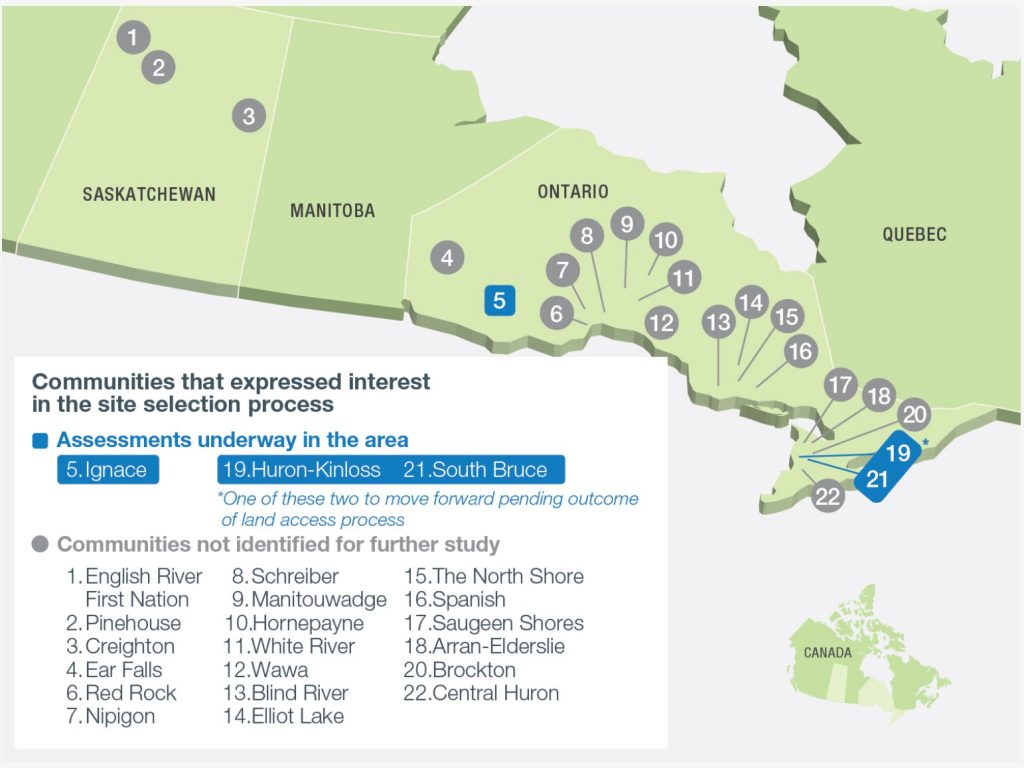
Currently the NWMO has narrowed the selection down to two potential siting areas. “The Township of Ignace in northwestern Ontario, and Township of Huron-Kinloss and Municipality of South Bruce in southern Ontario are considered potential host areas for the project” (NWMO, Site Selection, n.d.)
Indigenous Communities
| National level Organizations | Local/Regional Level Organizations |
| Congress of Aboriginal Peoples (CAP) Inuit Tapiriit Kanatami (ITK) Métis National Council (MNC) Native Women’s Association of Canada (NWAC) Pauktuutit Inuit Women’s Association | Atlantic Policy Congress of First Nations Chiefs (APC) Eabametoong First Nation, Fort Hope, Ontario East Coast First People’s Alliance Federation of Saskatchwen Indian Nations Northern Saskatchwen Ontario Métis Aboriginal Association (Ontario affiliate of CAP) Sakitawak Métis Society, Northwestern Saskatchwen Union of New Brunswick Indians Western Indian Treaty Alliance (WITA) Prince Albert Grand Council |
International Partners: Nuclear Energy Agency (NEA) of the Organization for Economic Co-operation and Development (OECD); International Atomic Energy Agency (IAEA); NWMO has signed or renewed co-operation agreements with Nuclear power counterparts – Sweden, Switzerland, Finland, France, Korea, Japan, and the United Kingdom; as NWMO is committed to international knowledge sharing (NWMO, News Release, 2018). In addition, these countries have Deep Geological Repositories to discard nuclear waste.
HERITAGE
Natural heritage: As mentioned in the Initial Screening criteria, NWMO has decided to avoid ecologically sensitive areas (protected areas) and areas of local significance (heritage sites, provincial parks, national parks) in the site selection process. In addition NWMO has committed to select a site where there are no sources of available groundwater at repository depth (of 500 m); where there are no economically exploitable natural resources available with the future generations in mind; which has no known geological and hydrogeological characteristics which could hinder the safety of the site (NWMO, Site Requirements, n.d.). As a result of this cautious approach, NWMO is preserving biodiversity in its commitment to safety and security. The Deep Geological Repository has been considered the safest mode of nuclear waste disposal internationally (NWMO, n.d.).
“Storage of radioactive waste has been demonstrated to be safe over some decades and can be relied upon to provide safety as long as active surveillance and maintenance is ensured. In contrast, geological disposal promises long term safety without surveillance and maintenance.”
(IAEA, 2003)
Cultural heritage: Values, traditions, customs and rights of Indigenous Peoples, First Nations and Métis communities are being acknowledged, respected, recognized and supported in the sharing of Traditional Ecological Knowledge/Aboriginal Traditional Knowledge/Indigenous Knowledge in the process of site selection and in all future processes of NWMO (Traditional Knowledge Workshop, 2008). This can be regarded as the first step in bridging the gap between Indigenous knowledge and Western Sciences. NWMO through its policies and seeking advice and consensus from the Indigenous Communities, Council of Elders and Youth has aided in the sustenance of culture and social values of the Indigenous peoples.
Linking Natural and Cultural Heritage: Passing on heritage information to the distant future has been made possible through the proposal of Centre of Expertise (NWMO, Surface facilities, n.d.). By closely working with communities and Indigenous people, and experts, NWMO is addressing the same goals in different views. This aspect of linking natural and cultural heritage satisfies Target 11.4 which advocates for strengthening efforts to protect natural and cultural heritage under Sustainable Development Goal 11 on Sustainable Cities and Communities.
“The engineering challenge of creating storage that will last for this time, is dwarfed by the communication challenge of explaining what it is to people in the distant future. This combination of preservation and communication makes partnership between heritage management and nuclear waste management fruitful.”
(Heritage Futures)
SUSTAINABILITY
Environmental sustainability: NWMOis committed to achieving livability through balanced growth with major focus on health and safety of the community and environment (NWMO, Mandate, n.d.). NWMO adopted an Environmental Policy that would guide all the processes. Environmental Assessment teams assess impacts on ecosystem and of climate change in the sites under consideration. NWMO states the reason for choosing a DGR as “A geological repository uses multiple barriers that include the waste form, container, sealing materials, and the host rock. The system is designed such that the failure of one component would not jeopardize the safety of the containment system as a whole.” OntarioPower Generation has a Deep Geological Repository near Lake Huron in Kincardine for the disposal of low-level and intermediate-level nuclear waste. The DGR proposed by NWMO will house the disposal of high-level waste (i.e.,) Used Nuclear Fuel (NWMO, Deep Geological Repository, n.d.).
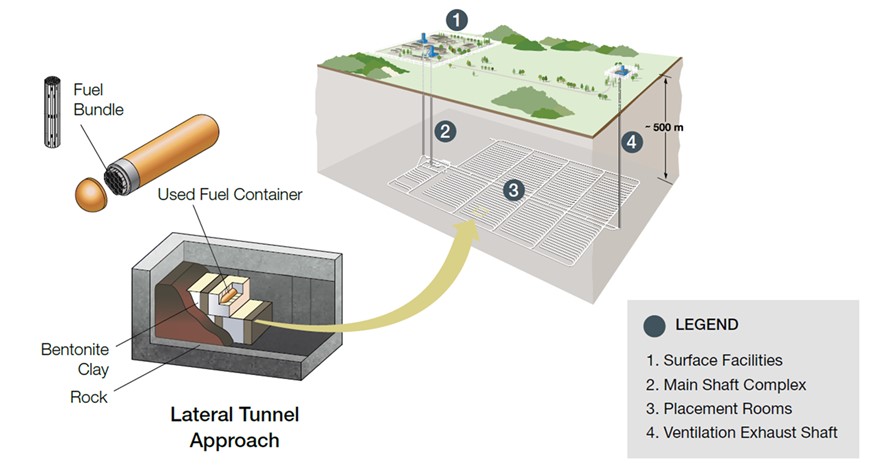
The NWMO works comply with Sustainable Development Goal 12 on Responsible Consumption and Production with focus on Targets 12.2 that deals with sustainable management and effective use of resources and Target 12.5 on waste reduction.
Socio-cultural sustainability: NWMOis working based on shared ethics with Indigenous peoples; and integrating Indigenous Knowledge in decision-making process which aids in the sustenance of their culture and social aspects. NWMO has plans for the construction of a Centre of Expertise at the site of the Deep Geological Repository to act as a place for testing and assessment of the site, and, sharing knowledge after the operations have begun and to convey about the work to the future generations (NWMO, Centre of Expertise, n.d.). This complies with Sustainable Development Goal 4 – Quality Education and specifically Target 4.7 which deals with the need for all learners to acquire the required skills to promote sustainable development. In addition, it also fulfills Targets 17.9 on capacity building in the implementation of goals and Target 17.17 on Multi-Stakeholder partnerships which involves engaging public, building on experience and resourcing strategies for partnerships, which are discussed under Sustainable Development Goal 17 on Partnership for the goals.
Economic sustainability: NWMO is funding involved communities as a form of recognition and is discussing with communities and Indigenous peoples on compensation of impacts – creating job opportunities is one among them as it has been stressed by the Indigenous communities in the workshops and dialogues held. Apart from creating jobs, NWMO currently has scholarships and donations programs for students from Indigenous, First Nations and Metis communities which satisfies Sustainable Development Goal 4 that deals with ensuring inclusive and equitable quality education.
MEASUREMENT
NWMO’s works for management and disposal of nuclear waste and their Indigenous relations as assessed based on four measurement tools:
United Nations Convention on Biological Diversity: The organization has adopted policies that applies to all works of NWMO with Indigenous peoples based on the United Nations Convention on Biological Diversity. Article 8(j), in particular, refers to indigenous knowledge and requires that: “The traditional knowledge of indigenous and local communities be respected, preserved and maintained; that the use of such knowledge should be promoted for wider application with the approval and involvement of the holders of such knowledge; and that they should equitably share in the benefits which arise from the use of their knowledge” (United Nations, 1992).
David Harmon in his article ‘A Bridge Over the Chasm’ has pointed out some of the factors to be considered in bridging natural and cultural heritage:
| Make a sustained effort to identify shared ethics | NWMO is working on the concept of shared ethics through its policies and continuous engagement with Indigenous communities. |
| Search for common terms of reference | NWMO works on the principles of safety and security of the people and the environment and Indigenous peoples refer to it as environmental stewardship. This common term of reference has enabled the continuous engagement of Indigenous peoples possible in the decision-making process (Aboriginal Policy, 2009 and Reconciliation Policy, 2019). |
| Get serious about interdisciplinarity | NWMO has taken up a community driven approach in safely managing and disposing nuclear waste apart from the policy or regulatory agencies, experts in nuclear power and environmental consultants. This interdisciplinary approach has ensured that everyone involved are well informed through the sharing of knowledge from both Traditional and Western sciences. |
| Focus on practical outcomes rather than on differences in how the world is understood | NWMO is organizing workshops to help in the exchange of knowledge to achieve best outcomes that are beneficial to everyone. The Traditional Knowledge Project of 2008 is a notable initiative that focused on personal experience gained by the Indigenous peoples on scientific approaches involved in a Deep Geological Repository through the visit to the DGR that was under construction in Kincardine, Ontario and the experience gained by technical staff to understand and value the culture and traditions of Indigenous peoples through the Cultural immersion in Traditional Knowledge on Mackenzie River. This project ended with a workshop to integrate both Traditional and Western sciences. |
Measuring NWMO’s Indigenous Relations with respect to United Nations Declaration on the Rights of Indigenous Peoples:
| UNDRIP | NWMO’s Indigenous Engagement |
| Article 19 States…obtain their free, prior and informed consent before adopting and implementing legislative or administrative measures that may affect them. | “The NWMO commits to…seeking the free, prior, and informed consent of impacted Indigenous peoples before proceeding with development of a deep geological repository.” (Reconciliation Policy, 2019) |
| Article 27 States shall establish and implement, in conjunction with indigenous peoples concerned, a fair, independent, impartial, open and transparent process, giving due recognition to indigenous peoples’ laws, traditions, customs and land tenure systems, to recognize and adjudicate the rights of indigenous peoples pertaining to their lands, territories and resources, including those which were traditionally owned or otherwise occupied or used. Indigenous peoples shall have the right to participate in this process. | NWMO has taken up an inclusive, open and transparent approach engaging communities and Indigenous peoples in the decision-making process. The organization has a Council of Elders and Youth who are a part of the Advisory Council and guide the NWMO’s implementation process. Through the formulation of policies that guide the engagement of Indigenous peoples and sharing of Traditional Knowledge in the process, the organization ensures that the rights and concerns of the Indigenous communities are addressed, Indigenous Knowledge is protected in the sharing process which has encouraged their participation in the decision-making process. |
| Article 29 2. States shall take effective measures to ensure that no storage or disposal of hazardous materials shall take place in the lands or territories of indigenous peoples without their free, prior and informed consent. | The Reconciliation Policy affirms that the implementation process of the Deep Geological Repository for the disposal of nuclear waste will seek the free, prior and informed consent of the Indigenous peoples. |
Ontario Nature has published Guiding Principles for Engagement in Conservation Offsetting with respect to Indigenous Communities:
| Guiding Principles | NWMO’s actions |
| Free, prior and informed consent | “The NWMO commits to… seeking the free, prior, and informed consent of impacted Indigenous peoples before proceeding with development of a deep geological repository.” (Reconciliation Policy, 2019) |
| Cultural Significance (Values) | Reconciliation Policy, 2019, “The NWMO commits to providing education for management and staff on the history of Indigenous peoples, …which will require skills-based training in intercultural competency, conflict resolution, human rights, and anti-racism as stated in the Truth and Reconciliation Commission call to action # 92.” “The NWMO commits to respecting and following local First Nation and Métis protocols related to burial sites found on work sites.” This commitment to contribute towards reconciliation by respecting Indigenous peoples, their rights, views and knowledge, and to pass it onto new employees has enabled the technical staff to value Indigenous peoples’ values and views. |
| Location of offset | NWMO is engaging communities and Indigenous peoples in the site selection process of the Deep Geological Repository to address the concerns and issues raised by them in terms of environmental and social impact. |
| Equity and cooperation | NWMO is working on shared ethics to ensure equitable participation and cooperation in all the stages of the decision-making process. |
| Transparency and communication | NWMO is organizing workshops to inform the Indigenous peoples of the scientific approach and in their commitment to respect Indigenous languages, is publishing the reports (of the workshops and other details) in 13 different languages apart from English (NWMO, n.d.) to ensure best communication and maintain transparency in the process. |
REFERENCES
Books/Book chapters/Journal articles
- Harmon, David, 2007, “A Bridge over the Chasm: Finding Ways to Achieve Integrated Natural and Cultural Heritage Conservation,” International Journal of Heritage Studies, 13. 4–5: 380–392.
- ON Nature magazine – Indigenous Perspectives on Conservation Offsetting. (2017, February). Retrieved from https://view.publitas.com/on-nature/indigenous-perspectives-on-conservation-offsetting.
Reports
- Barnaby, J., & Emery, A. (2008, November). Report of Traditional Knowledge Project. Retrieved from https://www.nwmo.ca/~/media/Site/Files/PDFs/2015/11/04/17/32/916_NWMODR-2008-03ReportofTraditionalKnowledgeProject.ashx?la=en.
- Implementing Adaptive Phased Management 2019 to 2023. (2019, March). Retrieved from https://www.nwmo.ca/~/media/Site/Reports/2019/03/19/14/45/NWMO-201923-Implementation-Plan–EN.ashx?la=en.
- Moving Forward Together: Process for Selecting a Site for Canada’s Deep Geological Repository for Used Nuclear Fuel. (2010, May). Retrieved from https://www.nwmo.ca/~/media/Site/Files/PDFs/2015/11/04/17/34/1545_processforselectingasiteforcan.ashx?la=en.
- INTERNATIONAL ATOMIC ENERGY AGENCY, VIENNA, (2003). The Long Term Storage of Radioactive Waste: Safety and Sustainability. Retrieved from https://www-pub.iaea.org/MTCD/Publications/PDF/LTS-RW_web.pdf
Policies
- Indigenous Knowledge Policy: NWMO. (2016, October). Retrieved from https://www.nwmo.ca/~/media/Site/Reports/2016/10/20/11/02/English_IndigenousKnowledgePolicy_2016.ashx?la=en.
- NWMO Aboriginal Policy. (2009)
- NWMO Environment Policy. (2018, January). Retrieved from https://www.nwmo.ca/~/media/Site/Files/PDFs/2019/05/16/17/25/EN_EnvironmentPolicy_2018.ashx?la=en.
- Reconciliation Policy. (2019, October). Retrieved from https://www.nwmo.ca/~/media/Site/Files/PDFs/2019/10/17/14/55/Reconciliation-Policy-2019.ashx?la=en.
- United Nations. 2015. Transforming Our World: the 2030 Agenda for Sustainable Development. https://sustainabledevelopment.un.org/content/documents/21252030%20Agenda%20for%20Sustainable%20Development%20web.pdf
- United Nations. 2007. United Nations Declaration on the Rights of Indigenous Peoples. https://www.un.org/development/desa/indigenouspeoples/wp-content/uploads/sites/19/2018/11/UNDRIP_E_web.pdf
- United Nations. 1992. CONVENTION ON BIOLOGICAL DIVERSITY. https://www.cbd.int/doc/legal/cbd-en.pdf
News releases by the NWMO:
- The NWMO issues Reconciliation Policy, calls on corporate Canada to join discussion: NWMO. (2019, October). Retrieved from https://www.nwmo.ca/en/More-information/News-and-Activities/2019/10/16/15/03/The-NWMO-issues-Reconciliation-Policy-calls-on-corporate-Canada-to-join-discussion.
- The NWMO issues Reconciliation Statement collaboratively with Indigenous Elders and youth: NWMO. (2018, July). Retrieved from https://www.nwmo.ca/en/More-information/News-and-Activities/2018/07/16/16/47/The-NWMO-issues-reconciliation-statement-collaboratively-with-Indigenous-Elders-and-youth.
- The NWMO Signs Co-Operation Agreements with International Partners. (2018, May). Retrieved from https://www.nwmo.ca/en/More-information/News-and-Activities/2018/05/09/11/44/The-NWMO-Signs-Cooperation-Agreements-with-International-Partners.
Key sections of the NWMO website:
- Nuclear Waste Management Organization. (n.d.). https://www.nwmo.ca.
- 11. Aboriginal Dialogues: NWMO. (n.d.). Retrieved from https://www.nwmo.ca/en/Canadas-Plan/Selecting-APM-A-Three-Year-Study/The-Study/Dialogue-Reports/11-Aboriginal-Dialogues.
- A Collaborative Approach: NWMO. (n.d.). Retrieved from https://www.nwmo.ca/en/Canadas-Plan/About-Adaptive-Phased-Management-APM/Implementing-the-Plan/A-Collaborative-Approach.
- Council of Elders and Youth: NWMO. (n.d.). Retrieved from https://www.nwmo.ca/en/ABOUT-US/How-We-re-Governed/Council-of-Elders.
- Indigenous Engagement: NWMO. (n.d.). Retrieved from https://www.nwmo.ca/en/A-Safe-Approach/About-the-Project/Working-in-Partnership/Engaging-With-People/Indigenous-Engagement.
- Natural Resources Canada. (2019, November 18). Retrieved from https://www.nrcan.gc.ca/home.
- Indigenous Knowledge: NWMO. (n.d.). Retrieved from https://www.nwmo.ca/en/Site-selection/About-the-Process/Indigenous-Knowledge.
Other websites
- Heritage Futures/SKB. Nuclear waste must be managed for thousands of years. What has heritage to learn and share on long term preservation? (n.d.). Retrieved from https://heritage-futures.org/uncertainty/nuclear-waste-management/.
Feature image credit: https://www.nwmo.ca/en/More-information/News-and-Activities/2018/07/16/16/47/The-NWMO-issues-reconciliation-statement-collaboratively-with-Indigenous-Elders-and-youth
